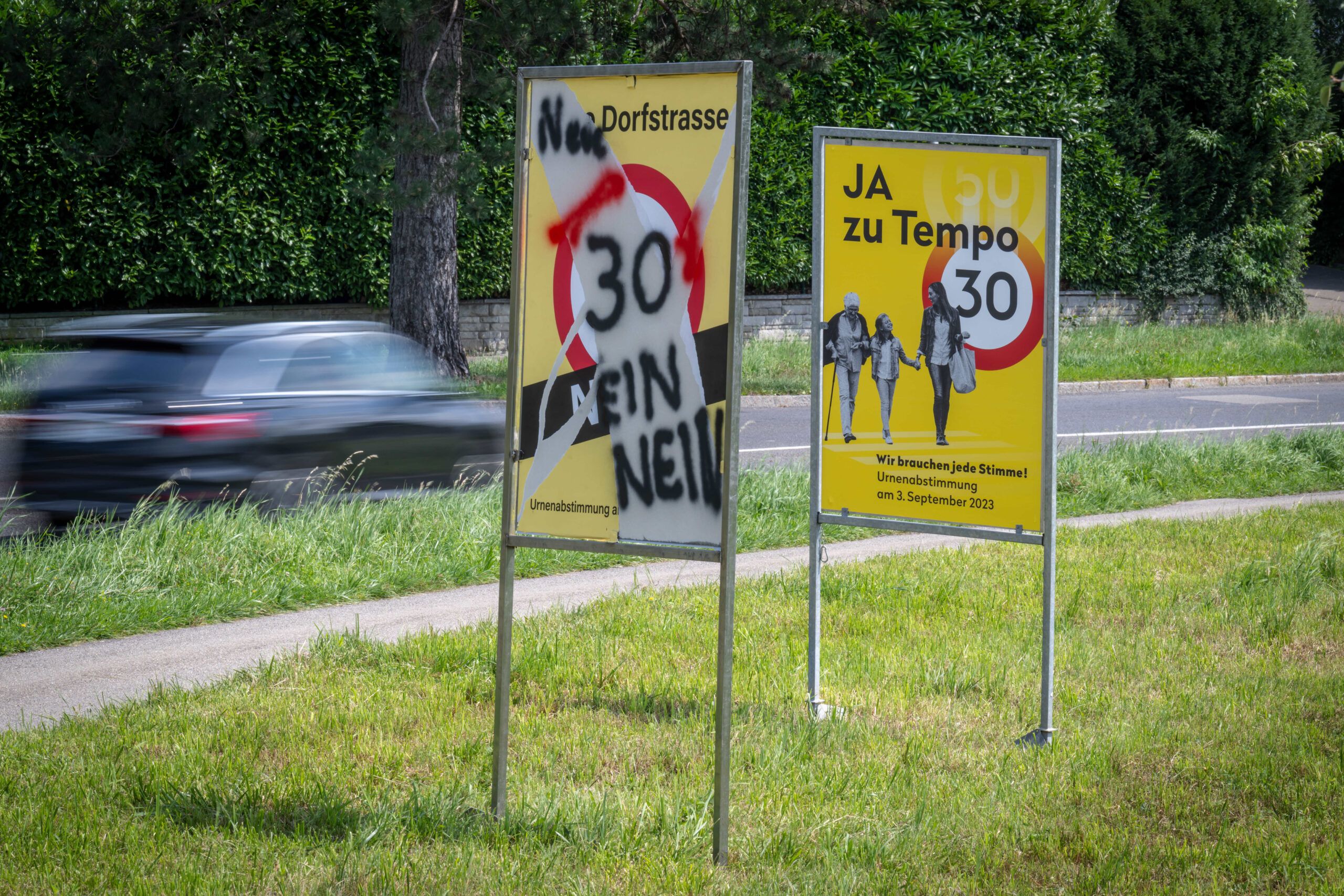
Do election posters make people angry? Emotions in political advertising
Advertising before votes can evoke different feelings: anger, hope, or concern. However, such emotions rarely arise in campaigns ahead of federal elections. The reasons for this are revealed in a new analysis by the Center for Democracy Studies Aarau in collaboration with Année Politique Suisse.
The images are familiar: smeared and scribbled-on election posters, torn-down and destroyed political advertising on the side of the road—someone is clearly very angry. Political advertising with pro and con slogans, according to popular opinion, can trigger strong emotions. But a new analysis shows that this view is misleading.
Surprisingly little emotion
As part of the research project «Direct Democracy in the 21st Century (DDS21)» (see box), the authors investigated the role emotions play in referendum campaigns and what political advertising needs to look like in order to arouse emotions. The study analyzed the impact of fictitious referendum advertisements on the BVG reform and the biodiversity initiative. The results show that political advertising triggers surprisingly little emotional response.
Party logo triggers different emotions
Despite the ubiquitous visual overload in today’s media landscape, the results show that political advertisements rarely trigger emotions such as anger, hope, or concern. The party logo and voting recommendations are most likely to elicit emotional responses, while color and image design play a lesser role.
“Our findings suggest that it is not so much the image itself as the political message and the sender that are decisive for the emotional impact,” explains study author Marc Bühlmann, director of Année Politique Suisse. For example, SP sympathizers feel above-average anger when they see an SVP logo, but a lot of hope when they see the same advertisement with their own party’s logo – the opposite is true for SVP supporters.
The study is based on an experiment with fictitious advertisements conducted in the run-up to the votes on September 22, 2024. The researchers emphasize that real campaigns accompanied by public debate and media coverage may trigger stronger emotions—an aspect that will be explored in more depth in further studies.
The project «Direct Democracy Switzerland in the 21st Century (DDS21)»
Since 2023, the research project Direct Democracy Switzerland in the 21st Century (DDS21), funded by the Swiss National Science Foundation (SNSF), has been investigating the reasons for Swiss citizens’ participation and voting decisions after each federal referendum. Led by the Centre for Democracy Studies Aarau, which is affiliated with the University of Zurich, DDS21 brings together members of Switzerland’s eight university political science institutes and the Liechtenstein Institute.
Further resources
Blog post on the DeFacto platform: What emotions are evoked by political advertising – DeFacto
Project website: https://www.dds21.uzh.ch/de.html
Questions
Prof. Dr. Marc Bühlmann, Director Année Politique Suisse
marc.buehlmann@unibe.ch, 079 354 88 79
About the CDA
The Centre for Democracy Studies Aarau is a scientific research centre supported by the University of Zurich, the University of Applied Sciences and Arts Northwestern Switzerland, the Canton of Aargau and the City of Aarau. It conducts basic research and addresses current issues relating to democracy – regionally, in Switzerland and worldwide. www.zdaarau.ch
About Année Politique Suisse
Since 1965, Année Politique Suisse (APS) has been providing a precise, factual and concise chronicle of developments in Swiss politics and society. We follow political issues from their inception to any referendums and their implementation, report on important social controversies, summarise practical studies and reports, track landmark court rulings, developments in the party landscape and much more. A central concern for us is to embed current events in their historical context, because current events are often merely highlights of lengthy, often repetitive processes that can be traced with APS and placed in a larger context.
In addition, APS provides a wealth of data on Swiss politics (e.g. swissvotes.ch) and participates in various political science research projects focusing on Switzerland. https://anneepolitique.swiss
Picture: Manuela Matt